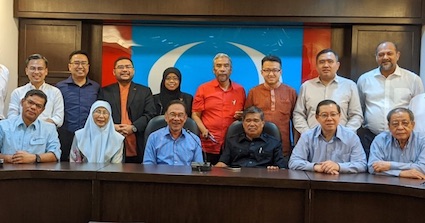2020 world corruption barometer: Malaysia dropped six rungs during Pakatan Harapan rule

(MMO) – Corruption appears to have worsened in Malaysia, according to Transparency International (TI), which placed the country 57th out of 180 countries last year.
Malaysia ranked 51st in the international watchdog’s Corruption Perception Index (CPI) in 2019.
Its Malaysian outfit, the Malaysian Society for Transparency and Integrity (TI-Malaysia) said the drop in ranking underscores the country’s deteriorating score, from 53 points in 2019 to 51 last year.
Countries are scored from zero to 100, with zero being perceived as the most corrupted, and 100 marks for those perceived as the cleanest and most transparent.
“Although a drop in the score appears statistically insignificant, the government must be cognizant(sic) that our rank falling XX steps means that compared to other countries, we are not improving as well as other countries in our efforts to fight corruption,” TI-Malaysia warned in a statement today.
The survey also found that Denmark and New Zealand were both ranked top of TI’s index with 88 points each, while at the opposite end of the corruption spectrum were countries like Syria (14 points), and the African nations of South Sudan and Somalia with 12 points each.
According to TI-Malaysia, Malaysia’s deterioration can be attributed to its institutional reforms that appear to have stalled over the past year.
An example it gave was failure by both the previous Pakatan Harapan administration and the subsequent Perikatan Nasional government to table the proposed Political Funding Bill in Parliament.
“Also the IPCMC (Independent Police Complaints and Misconduct Commission) Bill was revised to a watered down version and a largely ineffective IPCC (Independent Police Conduct Commission) Bill.
“Further, the separation of powers between the Attorney General and Public Prosecutor has yet to be initiated by the Government,” TI-Malaysia said.
Other reasons cited was the Discharge Not Amounting to Acquittal granted in several high-profile criminal cases, like the recent developments in former minister Datuk Seri Tengku Adnan Tengku Mansor’s corruption trial, an outcome that TI-Malaysia says would give a negative perception on how the legal process is being used.
It also cited other local issues such as limited access to information on cases of public interest such as the compensations involved in the cancelling of the High Speed Rail, and the exact breakdown of how Goldman Sachs supposed to compensate Malaysia for their part in the 1Malaysia Development Berhad (1MDB) scandal.
Other examples of the government supposedly hoarding information provided by TI-Malaysia include the lack of transparency on progress or public update on high profile cases like the Wang Kelian human trafficking issue at the Northern borders, the Sabah Water Scandal and the non-delivery of the Littoral Combat Ship.
The ongoing instances of abuse of power and corruption by public officials despite the Malaysian Anti Corruption Commission (MACC) appearing to actively track down corruption, like the issuing of fake visas by Immigration Department officers, alleged impunity given to meat-cartel members for over four decades, and lack of action taken despite mismanagements pointed out in the Auditor General’s reports were other weak points cited by TI-Malaysia.
The group suggested that Malaysia could improve its CPI rankings if it steps up institutional reforms and show greater transparency on matters of public interest. One way it said is to narrow the scope of what should be considered confidential under the Official Secrets Act.
Among other suggestions it gave was to empower the MACC further, pushing for the IPCMC Bill instead of the IPCC Bill, speed up the enactment of a political financing law to put an end to money politics, and to restore parliamentary democracy at the earliest opportunity.
“Only with such momentum and commitment from the leadership, the trajectory of the corruption perceptions index can be reversed,” TI-Malaysia said.
But it also commended the government for several things like gazetting the enforcement date of the Corporate Liability provision under the MACC Act to June 1, 2020, and continuing the National Anti-Corruption Plan (NACP).
“The NACP is a comprehensive plan but the government must ensure the implementation is effective and the Chief Secretary to the government should be empowered to lead the implementation and be made accountable,” TI-Malaysia added.

